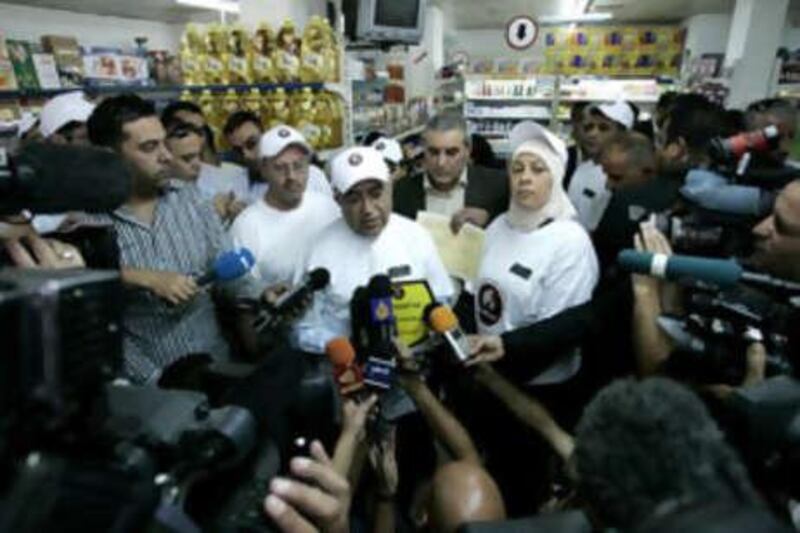RAMALLAH // Salam Fayyad, the Palestinian prime minister, yesterday launched a new stage in the Palestinian Authority's drive to rid Palestinian homes and shops of goods produced in Israeli settlements in occupied territory.
After an initial private-public sector agreement to jointly finance a public-relations campaign to educate Palestinian consumers about what products come from settlements and what Palestinian-produced alternatives there are, thousands of volunteers went door to door last month to reach out directly to consumers. Yesterday, Mr Fayyad launched the shop-to-shop stage of the campaign, in which volunteers will visit more than 66,000 outlets across the West Bank to inform shopkeepers of the campaign and provide them with stickers certifying that they are settlement product free.
"This is a new campaign, and an important part of the efforts, both official and popular, to cleanse the market of all settlements goods by the end of the year," Mr Fayyad told reporters yesterday on a visit to a supermarket in Ramallah. Essam Nuwara, 60, was almost certain that his small supermarket would pass muster. "I don't think there are any settlement goods in here," he said. "If there are, I will happily get rid of them."
The boycott campaign has proved widely popular among Palestinians, garnering even the support of Hamas legislators who do not otherwise recognise the legitimacy of the Fayyad government since it came to office by presidential decree after the Hamas takeover of Gaza in 2007. But it has met with fierce opposition in Israel, where Israeli legislators have branded the campaign "economic terrorism". Indeed, last month parliamentarians from the three main parties - the prime minister Benjamin Netanyahu's Likud Party; Yisrael Beitenu, Mr Netanyahu's main coalition partner; and Kadima, the biggest party in Israel and the leading party in the Israeli opposition - proposed a bill to counter the boycott.
The bill would make it illegal for Israelis and non-Israelis to support the boycott in deed or word. The former would be threatened with fines while the latter would risk being prevented from entering the country. The bill also seeks to punish the Palestinian Authority (PA) for launching the campaign by proposing that tax mony that Israel collects on behalf of the PA would be directed to afflicted settlements rather than handed over to the Palestinians and imposing further restrictions on Palestinian access to Israeli ports.
While the proposed legislation has yet to make it to a first reading - partly, some suggest, as a result of international pressure - that such a proposal should come up in the first place accurately reflects the atmosphere in Israel, according to Adam Keller of Gush Shalom, an Israeli peace movement. "Many Israelis feel, quite correctly, that Israel is being more and more isolated in the world. And there is in the Israeli public a growing segment that thinks that 'when the world hates us, we will hate them back', and 'when the world tells us to go to hell, we tell them to go to hell back'," Mr Keller said.
In an Israeli parliament dominated by right-wing parties, said Mr Keller, this has resulted in "all kinds of nasty, nationalistic proposals, some of them openly racist". Nevertheless, Mr Keller said he thought the bill was unlikely to be made into a law, because any Israeli government action against the PA in this regard would probably spell the end of the US-sponsored proximity talks and thus invoke the ire of Washington. Palestinian officials also said that they did not believe the bill would go far. "I doubt the bill will pass," said Ghassan Khatib, the director of the Palestinian government's media office. "Some of the measures in the bill are illegal and violate agreements [between Israel and the PLO] and are taken in response to a boycott that is perfectly legal." Mr Khatib also suggested that the proposed bill showed that the campaign was hurting Israeli companies. Israeli media have reported that some companies are now considering relocating factories from settlements to inside Israel, and some reports suggest that as many as 23 settlement businesses might have had to shut their doors in the past few months. Palestinian consumers are a prime market for Israeli settlement products, and the Palestinian ministry of national economy estimates that the annual trade is worth US$200 million (Dh735m). But Palestinian producers also depend on access to Israeli ports and borders for their raw materials. The Palestinian economy is in effect a captive economy, something that leaves Palestinians uniquely vulnerable to economic pressure, and Mr Nuwara said how successfully it responds to any Israeli counter measure would be a sign of the Palestinian government's seriousness in following through with the boycott. "Israel wants us to stay dependent on Israeli goods and products in our daily lives," said the shopkeeper. "This is quite logical, and it is difficult for us to respond effectively to any economic pressure for as long as we don't have an internationally recognised state with control over its own borders." okarmi@thenational.ae





